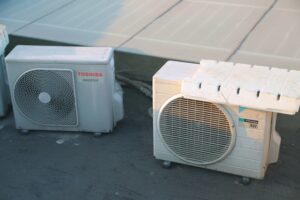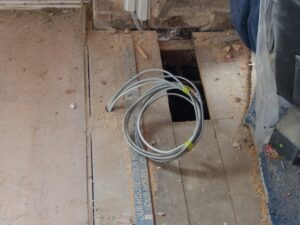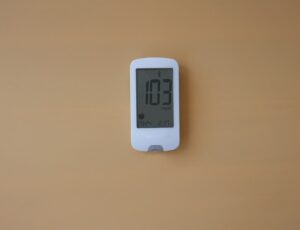When it comes to keeping your space comfortable—whether it’s your home, office, or commercial property—there’s nothing more important than a high-quality HVAC system.
It’s not just about controlling the temperature but about creating an environment where you can thrive, no matter the season. But here’s the thing—choosing the right HVAC system and ensuring it’s installed and maintained properly can drastically affect your comfort and energy bills.
But how do you make sure you’re getting the best of both worlds?
The secret lies in professional installation and service.
When you partner with the right experts, like Excel Mechanical, you’re not just getting a system, you’re getting a tailored solution that meets your specific needs. Whether you need a new installation or you’re looking to make sure your current system is running efficiently, we’ve got you covered.
We believe in delivering nothing less than the best HVAC and plumbing solutions for our customers. Our team of experts works with you to understand your unique requirements, helping you get the perfect system that aligns with your budget and your needs.
Skilled installation and regular maintenance don’t just extend the lifespan of your equipment; they also keep it running at peak performance year-round. Why settle for less when you can enjoy maximum value and efficiency?
We don’t just focus on getting the job done—we focus on getting it done right. With deep expertise in both residential and commercial HVAC systems, we ensure that your system is installed and maintained with precision. The result?
A reliable system that keeps your indoor atmosphere comfortable without all the stress or unexpected costs.
In this blog, you will learn:
- Why proper HVAC installation is crucial for long-term efficiency and comfort.
- How Excel Mechanical tailors solutions to fit your needs and budget.
- The key benefits of choosing a professional HVAC team for installation and maintenance.
Ready to experience unmatched comfort and efficiency?
Let’s make sure your HVAC system is set up to perform at its best!
Understanding HVAC Systems
HVAC systems are crucial for maintaining comfort in homes and businesses. They regulate temperature, humidity, and air quality. Understanding how these systems work and the different types available can help you choose the best option for your needs.
Components and Functionality
An HVAC system has several key components, including the furnace, air conditioner, ductwork, and thermostat.
The furnace heats the air in the colder months, while the air conditioner cools it during warmer times. Ductwork distributes the conditioned air throughout the building, and the thermostat allows you to control the system’s operation.
Proper maintenance of these components is essential. This ensures efficient operation and extends the system’s lifespan. Regular checks and cleaning prevent issues like blockages and wear that can reduce performance.
You can maintain an effective and reliable HVAC system by understanding each part and its function.
Types of HVAC Systems
There are various types of HVAC systems that meet different needs.
- A split system has separate indoor and outdoor units, offering flexibility and efficiency. Packaged systems combine heating and cooling components in one unit, making them ideal for limited space areas.
- Ductless systems use individual units in each room, controlling temperature for particular zones without ducts. This is suitable for homes without existing ductwork.
Each type caters to different requirements, so consider factors like space, budget, and energy efficiency.
Benefits of High-Quality HVAC Installation
A high-quality HVAC installation can significantly affect your home or business. You’ll notice improved energy efficiency, better air quality, and increased system longevity.
Energy Efficiency
When an HVAC system is installed properly, it uses less energy to heat or cool your space.
This can lead to noticeable savings on your energy bills. Proper installation minimizes air leaks and ensures efficient ductwork. Systems set up with the correct specifications perform better and reduce wasted energy.
Using high-quality materials and techniques during installation can increase these benefits. Investing now means saving money down the road in reduced energy consumption.
Improved Air Quality
A well-installed HVAC system enhances air quality by reducing dust, allergens, and pollutants.
It ensures that air filters work effectively by sealing off gaps where contaminants could enter. Adjusting ventilation appropriately can improve air circulation and keep indoor environments healthier.
Good installation ensures that air flows evenly throughout every room. This makes spaces more comfortable and safeguards your health by maintaining clean air.
Longevity and Reliability
Quality installation extends the lifespan of your HVAC system.
Properly connecting and calibrating parts reduces wear and tear, preventing premature breakdowns. This boosts system reliability, resulting in fewer repair needs over time.
When systems work efficiently, their components experience less stress, delaying the need for replacements. Investing in high-quality installation means choosing reliability and peace of mind for years.
By offering systems tailored to individual budgets and needs, Excel Mechanical ensures that your installation lasts longer and provides consistent performance.
HVAC Installation Process
Installing a high-quality HVAC system involves several essential steps. From assessing your space and needs to selecting the right equipment and ensuring proper installation, each part of the process is crucial to achieving optimal performance.
Assessment and Planning
The first step in the HVAC installation process is a thorough assessment.
Professionals evaluate the specific needs of your home or business, checking the size and layout of the space. They consider factors like insulation, window placement, and existing ductwork. This information helps determine the appropriate HVAC system size and type.
Proper planning is key. An accurate assessment ensures energy efficiency and adequate heating and cooling performance. When you work with a reputable company, you benefit from their commitment to providing a system tailored to your unique requirements.
Equipment Selection
Next, selecting the right HVAC equipment is necessary.
Choices include various models and brands that offer different features, efficiencies, and price points. Energy efficiency ratings, such as SEER for air conditioners and AFUE for furnaces, are essential when selecting equipment.
Consider the system’s compatibility with your space and budget. Energy-efficient models can reduce long-term costs.
Installation Best Practices
Proper installation is crucial for system efficiency and longevity.
Technicians must follow best practices, including correct positioning, proper connections, and precise calibration. Installation methods should adhere to industry standards, ensuring safe and effective operation.
Regular inspections and testing during installation catch potential issues early. Skilled professionals follow rigorous protocols to minimize disruptions.
This step ensures your HVAC system functions efficiently from day one.
Professional HVAC Service and Maintenance
Professional HVAC service is essential for ensuring the longevity and efficiency of your heating and cooling systems. Regular maintenance and skilled troubleshooting will keep your equipment running smoothly and efficiently.
Regular Maintenance Schedules
Keeping a consistent maintenance schedule for your HVAC system is key.
Regular checks help catch potential problems early. This includes inspecting key components like filters, coils, and fans. Clean filters improve air quality and efficiency, potentially lowering energy bills.
Technicians can measure your system’s performance to optimize energy use. Lubrication and adjustment of parts reduce wear and tear. Regular maintenance can extend the life of your HVAC system, saving you money in the long term.
Troubleshooting Common Issues
Even with regular upkeep, problems can arise.
Recognizing warning signs like uneven cooling or heating, strange noises, and unexpected spikes in energy bills can indicate issues.
Common problems include thermostat malfunctions, dirty filters, and refrigerant leaks. Knowing these signs allows for a swift response. Expert technicians evaluate the root cause and apply appropriate repairs. Our specialists provide professional solutions with top-quality service to restore comfort quickly and efficiently.
Staying informed and proactive about your HVAC maintenance helps ensure a comfortable home or business environment.
Choosing an HVAC Contractor
Selecting the right HVAC contractor ensures your system works efficiently and reliably. You want a contractor with strong qualifications, proper certifications, and positive customer feedback. These factors help guarantee quality service.
Qualifications and Experience
When choosing an HVAC contractor, one of the most critical aspects is their qualifications and experience.
Look for a contractor who has been in the industry for several years. This usually means they have faced and solved various HVAC challenges. They should know new technologies and older systems to provide tailored solutions for your home or business.
Experienced contractors like Excel Mechanical offer HVAC services marked by a dedication to quality and value. We know how to deliver efficient installations and timely repairs. Your comfort and satisfaction should be their priority.
Certifications and Licenses
Certifications and licenses prove that a contractor is trained and authorized to perform HVAC services. They must have the necessary state or local licenses.
Check if they hold certifications from respected bodies like NATE (North American Technician Excellence). These are important because they show the contractor’s commitment to high standards.
A licensed contractor ensures safety and reliability in their work and follows regulations that protect your home and family.
Customer Reviews and Testimonials
Customer reviews and testimonials provide valuable insights into a contractor’s reputation.
Look for feedback about their punctuality, professionalism, and the quality of their work. Consistently positive reviews suggest reliability and satisfaction among past clients.
Online reviews like Google or Yelp can help you understand what to expect. Listening to other customers’ experiences can guide your choice, ensuring you pick a contractor who effectively meets your needs.
Frequently Asked Questions
When it comes to HVAC systems, there are often a lot of questions floating around. Whether you’re a first-time homeowner or a seasoned business owner, understanding your HVAC system can seem like a maze. But don’t worry—we’re here to help you navigate through some of the most common questions we get.
What should I expect to pay for a new HVAC system installation?
A new HVAC system can cost between $3,000 and $7,000. Factors like the size of your home, energy efficiency ratings, and the type of system will affect the final price. It’s essential to obtain detailed quotes from several providers.
How do I identify a reputable HVAC service provider?
Look for providers with strong customer reviews and proper certifications. Checking if they offer warranties and maintenance plans can also be helpful. Excel Mechanical is known for exceptional quality and service, making us a top choice for residential and commercial needs.
What are the indicators of a high-quality HVAC system?
A high-quality system will have a good SEER rating, quiet operation, and advanced features like smart thermostats. It should also come with a reliable warranty and be installed by qualified professionals.
How often should HVAC systems receive professional maintenance?
HVAC systems should have professional maintenance at least once a year. This ensures efficiency and longevity. Regular check-ups help catch potential problems early, saving you from costly repairs.
What factors influence the cost of installing an HVAC system in a residential property?
The size of your home dramatically impacts cost. Energy efficiency preferences and the complexity of the installation also play roles. Additional features and zoning requirements can increase overall expenses.
What are the long-term benefits of investing in a high-efficiency HVAC system?
High-efficiency systems lower energy bills and reduce environmental impact. They also enhance comfort and indoor air quality. Choosing Excel Mechanical ensures you receive a system tailored to your needs, maximizing both efficiency and value.




